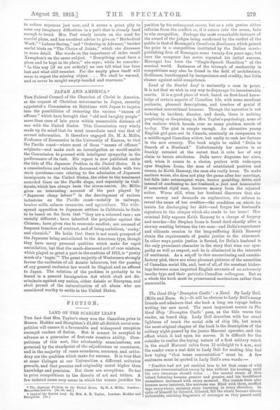The Good Ship Brompton Castle a Novel. By Lady Bell.
(Mills and Boon. 65.)—It will be obvious to Lady Bell's many friends and admirers that she took a long sea voyage before writing her new novel. The most important scenes in The Good Ship BromptO n Castle' pass, as the title warns the reader, on board ship. Lady Bell describes with her usual lightness of touch the social side of ship life, but much the most original chapter of the book is the description of the solitary night passed by the junior Marconi operator, and the effect which it had upon his nerves, It is difficult for the outsider to realize the trying nature of a first solitary watch in the small Marconi cabin from 12 midnight to 4 a.m., and the reader owes a real debt to Lady Boll for making him feel how trying "that tense concentration" must be. A few sentences must be quoted in Lady Bell's own words:— " Practice had not yet enabled him to let that ocean of wild ceaseless communication sweep by him without his hooding, until his own summons should come . . . the mental strain of that intent listening became greater and greater, and his bewildered uneasiness increased with every moment. The sounds from afar became more insistent, the universe was filled with them, muffled taps everywhere, uncanny steps hurrying in every direction. In spite of himself ho listened, listened, till tho strain becalm) almost unbearable, catching fragments of messages as they passed until his brain refused to grasp them. The signals became multiplied with the darkness, those signals which at any moment might seize himself and force him to listen. Would he be able to answer, to spell them out, if they cam`o ? He felt as if his brain would refuse to work. And he shivered at the thought that one of those calls —from whence, out of what P—might be for him to answer, for him, that quaking human being confronted with immensity. Yes, now that at last he was confronted with the Great Opportunity, he prayed God that it might not come, lest he should fail to take it. The tappings increased with the darkness, there were sounds round him, behind him, everywhere."
Truly Mr. Kipling was right when he wrote his refutation of the foolish saying that in the modern world romance is dead. Is there anything in the old world comparable to the excite- ment and romance felt by a Marconi operator sitting in lonely darkness in the middle of the ocean, late at night, with inesseges crowding on his senses from every side and knowing that the fate of hundreds of people may depend solely upon his alertness P



































 Previous page
Previous page